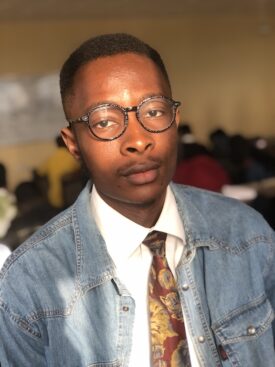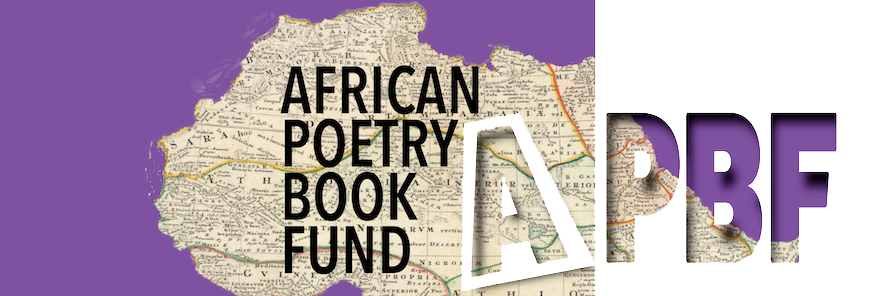Chapbook Chats: Tryphena Yeboah Interviews “Rose Ash” Author Samuel Adeyemi
To celebrate the launch of the latest in the New-Generation African Poets Chapbook Box Set series, Tisa, Tryphena Yeboah, is talking to poets whose chapbooks are included in the New-Generation African Poets: A Chapbook Box Set (Tisa). This series continues with a conversation between Tryphena and poet Samuel Adeyemi. The interview was conducted via email and has been lightly edited for publication.

Tryphena Yeboah: Congratulations on being selected as part of the 2023 New-Generation African Poets series! What a wonderful time for you, and a tremendous contribution to the growing body of African poetry in the world. What are your thoughts and feelings about this news?
Samuel Adeyemi:Thank you very much! It has always been my dream to be affiliated with ABPF, so it certainly feels great to now be a part of the 2023 New-Generation African Poets series. I’m excited and grateful for the opportunity.
TY: Rose Ash interrogates the subject of religion and unbelief, particularly, through the lens of speakers who are unafraid to ask the hard questions about faith. There’s also keen attention given to the body and its experience of pain, even the self-inflicted kind. What drew you to these themes and how would you describe your experience reflecting and wrestling with these subjects?
SA: The themes in Rose Ash hold a significant place in my heart. I was drawn to exploring each one of them because they are important aspects of human life. My poetry is very personal, so you can assume the confessional poems are indeed about my experiences. Reflecting and wrestling with these subjects were not so challenging since I’m already familiar with that level of vulnerability in my writing. It did require a lot of self-awareness, introspection, and remembering to delve into the complexities that accompany writing about those experiences.
TY: I would love to hear about the process of constructing your chapbook. How did you conceive of ordering the collection? Did you discover or build any particular writing habits over the time you spent creating these poems?
SA: Constructing Rose Ash was quite interesting. I never thought I would be able to complete the manuscript because I had been seriously burnt out during the solicitation period. I had just written and published my first chapook, Heaven Is a Metaphor, during that period, so it was a bit challenging to birth new material within the required timeframe. Miraculously, we are here. About ordering, I wasn’t strict with how the poems in this particular collection would be arranged. We also had to drop a couple of poems during the editing stage (I had assumed it would be a lengthy chapbook). It was a bit chaotic, but it worked out in the end. One habit I learnt during that period was documenting random thoughts. I was desperately in need of new material, so every line that darted into my head got written down in my notepad, with the hope of using it in a poem, as a beginning or otherwise.
TY: As a selectee for this year’s new generation series, you have become part of the APBF African poets “family”. What does it mean to be part of a growing body of contemporary poets emerging from the continent?
SA: Being part of the APBF African poets family is truly an honour. It means being surrounded by a community of talented poets, all contributing their unique voices to the richness of contemporary African poetry. The sense of belonging is truly inspiring and even historical.
TY: What does being an African poet mean to you?
SA: There is so much discourse today about what it means to be an African poet in this age. Some critics obsess over the function of language in communicating identity, especially whether we can truly be African in our poetry if we write in English. There is also the discourse of African poetry becoming too confessional, emulating the sound of American poetry. I must admit, most of their hearts are in the right place, but a lot of their arguments often end with their simplistic, unproductive “criticism.” That aside, I believe being an African poet means embracing my culture and celebrating the diversity and richness of the African continent. But being an African poet is also expressing my joys, my travails—my all-in-all human experience as an African, as a Nigerian, whether your idea of “African” or “Nigerian” is chained to the imagery of a culturally-versed voice or not. Being confessional is also African because emotions are universal.
I believe being an African poet means embracing my culture and celebrating the diversity and richness of the African continent. But being an African poet is also expressing my joys, my travails—my all-in-all human experience as an African, as a Nigerian
Samuel Adeyemi
TY: Your second poetry chapbook is out in the world and I hope this is not too daunting of a question to ask, but I’m eager to hear what projects you’re currently working on and if you have any exciting works in the pipeline?
SA: Ah, I’ve been working on a new manuscript for a while now. It’s currently at chapbook length. I’m still contemplating whether I should extend it to a full-length collection. Thematically, it’s a little different from my usual stuff. The poems are often concerned with healing—the journey towards it. I’m really excited about it and I can’t wait to release it. A few poems from the manuscript should be published soon in Lolwe.
Samuel A. Adeyemi is a Poetry Editor at Afro Literary Magazine. A Best of the Net and Pushcart Nominee, he is the winner of the Nigerian Students Poetry Prize 2021. His works have appeared—or are forthcoming—in Palette Poetry, Frontier Poetry, 580 Split, Strange Horizons, Agbowo, Brittle Paper, Jalada, and elsewhere.
Tryphena Yeboah is a Ghanaian writer and the author of the poetry chapbook, A Mouthful of Home, selected by the New Generation African Poets Series. Her fiction and essays have appeared in Narrative Magazine, Commonwealth Writers, and Lit Hub, among others. She is currently a Ph.D. student at the University of Nebraska-Lincoln, studying English with an emphasis in Creative Writing
